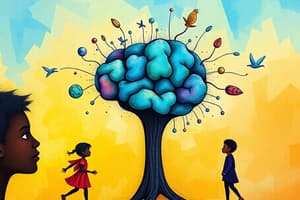Podcast
Questions and Answers
Who developed the Psychosocial Theory?
Who developed the Psychosocial Theory?
Erik Erikson
How many stages are in Erikson's Psychosocial Theory?
How many stages are in Erikson's Psychosocial Theory?
8 stages
Name the stages in Erikson's Theory.
Name the stages in Erikson's Theory.
- Infancy (Trust vs Mistrust) 2. Early Childhood (Autonomy vs Shame and Doubt) 3. Late Childhood (Initiative vs Guilt) 4. School Age (Industry vs Inferiority) 5. Adolescence (Identity vs Role Confusion) 6. Young Adulthood (Intimacy vs Isolation) 7. Adulthood (Generativity vs Stagnation) 8. Old Age (Ego Integrity vs Despair)
What does the stage of Infancy focus on?
What does the stage of Infancy focus on?
What is the focus during the Early Childhood stage?
What is the focus during the Early Childhood stage?
What is the focus of the Late Childhood stage?
What is the focus of the Late Childhood stage?
What is the School Age stage characterized by?
What is the School Age stage characterized by?
What is the major challenge in Adolescence?
What is the major challenge in Adolescence?
What emotional focus is present during Young Adulthood?
What emotional focus is present during Young Adulthood?
What does Adulthood emphasize?
What does Adulthood emphasize?
What is the focus during Old Age?
What is the focus during Old Age?
What is Sybil experiencing at 86 years old?
What is Sybil experiencing at 86 years old?
What stage is Carol experiencing at 48?
What stage is Carol experiencing at 48?
What are many adolescents likely experiencing during their development?
What are many adolescents likely experiencing during their development?
What has Tina successfully obtained?
What has Tina successfully obtained?
Flashcards
Erikson's Psychosocial Theory
Erikson's Psychosocial Theory
A stage theory of development that describes eight stages across the lifespan, each with a psychosocial crisis
Infancy stage
Infancy stage
First stage (Trust vs. Mistrust) where infants learn to trust or mistrust caregivers based on their experiences
Early Childhood stage
Early Childhood stage
Second stage (Autonomy vs. Shame and Doubt) where toddlers learn independence or doubt their abilities
Late Childhood stage
Late Childhood stage
Signup and view all the flashcards
School Age stage
School Age stage
Signup and view all the flashcards
Adolescence stage
Adolescence stage
Signup and view all the flashcards
Young Adulthood stage
Young Adulthood stage
Signup and view all the flashcards
Adulthood stage
Adulthood stage
Signup and view all the flashcards
Old Age stage
Old Age stage
Signup and view all the flashcards
Trust vs Mistrust
Trust vs Mistrust
Signup and view all the flashcards
Autonomy vs Shame and Doubt
Autonomy vs Shame and Doubt
Signup and view all the flashcards
Initiative vs Guilt
Initiative vs Guilt
Signup and view all the flashcards
Industry vs Inferiority
Industry vs Inferiority
Signup and view all the flashcards
Identity vs Role Confusion
Identity vs Role Confusion
Signup and view all the flashcards
Intimacy vs Isolation
Intimacy vs Isolation
Signup and view all the flashcards
Generativity vs Stagnation
Generativity vs Stagnation
Signup and view all the flashcards
Ego Integrity vs Despair
Ego Integrity vs Despair
Signup and view all the flashcards
Study Notes
Erik Erikson's Psychosocial Theory
- Developed by Erik Erikson, the Psychosocial Theory outlines development through 8 stages across a lifetime.
- Key focus is on psychosocial conflicts that shape personality and behavior.
Stages of Development
- Infancy (Birth - 18 months): Trust vs. Mistrust; development of trust in caregivers leads to security.
- Early Childhood (18 months - 3 years): Autonomy vs. Shame and Doubt; fostering independence is crucial.
- Late Childhood (3 - 6 years): Initiative vs. Guilt; gaining purpose and directing activities enhances self-esteem.
- School Age (6 - 12 years): Industry vs. Inferiority; success in learning and competition builds confidence.
- Adolescence (12 - 20 years): Identity vs. Role Confusion; developing a secure sense of self amidst various identities.
- Young Adulthood (20 - 30 years): Intimacy vs. Isolation; forming deep relationships and commitments is essential.
- Adulthood (30 - 65 years): Generativity vs. Stagnation; contributing to society and nurturing the next generation leads to fulfillment.
- Old Age (65 years - death): Ego Integrity vs. Despair; looking back on life with contentment vs. regret influences the final stage.
Case Studies and Situations
- Sybil (86 years): Experiences despair; regrets overshadow her view of life due to unmet aspirations.
- Carol (48 years): Represents Generativity; actively supporting her children and in-laws reflects contribution to family and society.
- Adolescents: Often experience role confusion, unsure of their identity and belonging, significant for personal development.
- Tina (successful nursing graduate): Achieving intimacy; plans to deepen her relationship showcases personal growth.
- Judas (newborn): Exhibits trust; comfortably allows others to hold him, indicating successful development of trust in caregivers.
Studying That Suits You
Use AI to generate personalized quizzes and flashcards to suit your learning preferences.




